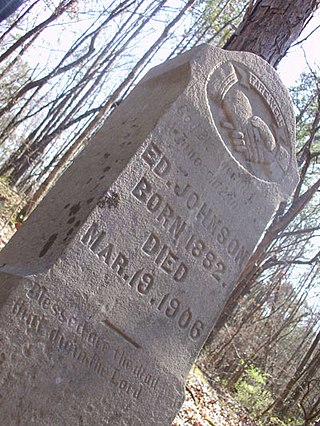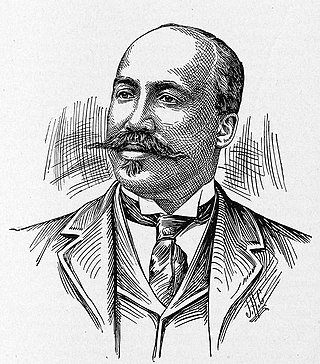The term legal technicality is a casual or colloquial phrase referring to a technical aspect of law. The phrase is not a term of art in the law; it has no exact meaning, nor does it have a legal definition. In public perception, it typically refers to "procedural rules that can dictate the outcome of a case without having anything to do with the merits of that case." However, as a vague term, the definition of a technicality varies from person to person, and it is often simply used to denote any portion of the law that interferes with the outcome desired by the user of the term.

Columbia is a city in and the county seat of Maury County, Tennessee. The population was 41,690 as of the 2020 United States census. Columbia is included in the Nashville metropolitan area.
Ex parte Milligan, 71 U.S. 2 (1866), is a landmark decision of the U.S. Supreme Court that ruled that the use of military tribunals to try civilians when civil courts are operating is unconstitutional. In this particular case, the Court was unwilling to give former President Abraham Lincoln's administration the power of military commission jurisdiction, part of the administration's controversial plan to deal with Union dissenters during the American Civil War. Justice David Davis, who delivered the majority opinion, stated that "martial rule can never exist when the courts are open" and confined martial law to areas of "military operations, where war really prevails", and when it was a necessity to provide a substitute for a civil authority that had been overthrown. Chief Justice Salmon P. Chase and three associate justices filed a separate opinion concurring with the majority in the judgment, but asserting that Congress had the power to authorize a military commission, although it had not done so in Milligan's case.

The Scottsboro Boys were nine African American male teenagers accused in Alabama of raping two white women in 1931. The landmark set of legal cases from this incident dealt with racism and the right to a fair trial. The cases included a lynch mob before the suspects had been indicted, all-white juries, rushed trials, and disruptive mobs. It is commonly cited as an example of a legal injustice in the United States legal system.

Built in 1890, the 2,376-foot-long (724 m) Walnut Street Bridge connects Chattanooga, Tennessee's downtown with North Chattanooga. The bridge's main spans are pin-connected Pennsylvania through truss spans. The top chord of these truss spans are configured in five sections, making the spans similar to the Camelback truss design. The bridge is historically significant as an extremely long and old example of its type; according to the Historic American Engineering Record: "The bridge was apparently the first non-military highway bridge across the Tennessee River."
Moore et al. v. Dempsey, 261 U.S. 86 (1923), was a United States Supreme Court case in which the Court ruled 6–2 that the defendants' mob-dominated trials deprived them of due process guaranteed by the Due Process Clause of the Fourteenth Amendment. It reversed the district court's decision declining the petitioners' writ of habeas corpus. This case was a precedent for the Supreme Court's review of state criminal trials in terms of their compliance with the Bill of Rights.
United States v. Cecil Price, et al., also known as the Mississippi Burning trial or Mississippi Burning case, was a criminal trial where the United States charged a group of 18 men with conspiring in a Ku Klux Klan plot to murder three young civil rights workers in Philadelphia, Mississippi on June 21, 1964 during Freedom Summer. The trial, conducted in Meridian, Mississippi with U.S. District Court Judge W. Harold Cox presiding, resulted in convictions of 7 of the 18 defendants. Another defendant, James Edward Jordan, pleaded guilty and testified for the prosecution.
The Groveland Four were four African American men, Ernest Thomas, Charles Greenlee, Samuel Shepherd, and Walter Irvin. In July 1949, the four were accused of raping a white woman and severely beating her husband in Lake County, Florida. The oldest, Thomas, tried to elude capture and was killed that month. The others were put on trial. Shepard and Irvin received death sentences, and Greenlee was sentenced to life in prison. The events of the case led to serious questions about the arrests, allegedly coerced confessions and mistreatment, and the unusual sentencing following their convictions. Their incarceration was exacerbated by their systemic and unlawful treatment—including the death of Shepherd, and the near-fatal shooting of Irvin. Greenlee was paroled in 1962 and Irvin in 1968. All four were posthumously exonerated by the state of Florida in 2021.

Melville Weston Fuller was an American politician, attorney, and jurist who served as the eighth chief justice of the United States from 1888 until his death in 1910. Staunch conservatism marked his tenure on the Supreme Court, exhibited by his tendency to support unfettered free enterprise and to oppose broad federal power. He wrote major opinions on the federal income tax, the Commerce Clause, and citizenship law, and he took part in important decisions about racial segregation and the liberty of contract. Those rulings often faced criticism in the decades during and after Fuller's tenure, and many were later overruled or abrogated. The legal academy has generally viewed Fuller negatively, although a revisionist minority has taken a more favorable view of his jurisprudence.

Edward Terry Sanford was an American jurist who served as an associate justice of the Supreme Court of the United States from 1923 until his death in 1930. Prior to his nomination to the high court, Sanford served as a United States Assistant Attorney General under President Theodore Roosevelt from 1905 to 1907, and as a United States district judge of the United States District Court for the Eastern District of Tennessee and the United States District Court for the Middle District of Tennessee from 1908 to 1923. As of 2023, he is the last sitting district court judge to be elevated directly to the Supreme Court.

On March 19, 1906, Ed Johnson, a young African American man, was murdered by a lynch mob in his home town of Chattanooga, Tennessee. He had been sentenced to death for the rape of Nevada Taylor, but Justice John Marshall Harlan of the United States Supreme Court had issued a stay of execution. To prevent delay or avoidance of execution, a mob broke into the jail where Johnson was held, and abducted and lynched him from the Walnut Street Bridge.

The Knoxville riot of 1919 was a race riot that took place in the American city of Knoxville, Tennessee, on August 30–31, 1919. The riot began when a lynch mob stormed the county jail in search of Maurice Mays, a biracial man who had been accused of murdering a white woman. Unable to find Mays, the rioters looted the jail and fought a pitched gun battle with the residents of a predominantly black neighborhood. The Tennessee National Guard, which at one point fired two machine guns indiscriminately into this neighborhood, eventually dispersed the rioters. Headlines in the immediate aftermath stated five people were killed, while the Washington Times reported "Scores dead." Other newspapers placed the death toll at just two, though eyewitness accounts suggest it was much higher.
On February 9, 1893, Alfred Blount, an African American and a Chattanooga native, was taken from his jail cell in the county jail and brutally beaten, stabbed, and hanged from the Walnut Street Bridge in Chattanooga, Tennessee. Blount was charged with assault of a woman by the name of Mrs. M. A. Moore. Moore, 51 and widowed, claimed she was cleaning her house when a man entered through her back door requesting food. Moore, assuming it was a neighbor of hers, invited the man in and called out to her African-American house boy Sam to bring the man some food. Upon realizing Sam's absence, Moore herself went into the kitchen to prepare food before reporting being grabbed by the arm and attacked by the man. After hitting the man with her hand, Moore fainted and laid unconscious in her house before recalling the incident to her neighbor, Mrs. DeRochement.

Noah Walter Parden was an American attorney and politician who was active in Chattanooga, Tennessee, East St. Louis, Illinois, and St. Louis, Missouri between 1891 and 1940. In 1906 he became one of the first African-American attorneys to serve as lead counsel in a case before the United States Supreme Court, and he was among the first to make an oral argument before the Court. In 1935 he became the first African American to be appointed to the position of Assistant Prosecuting Attorney, a public office, in St. Louis.
Bell v. Cone, 535 U.S. 685 (2002), was a Supreme Court of the United States case that upheld a death sentence despite the defendant's argument that he should not be sentenced to death because he was suffering from drug-induced psychosis when he committed the crimes. Cone also argued that he was denied effective assistance of counsel because his attorney failed to present sufficient mitigating evidence during the sentencing phase of his trial and that his attorney inappropriately waived his final argument during the sentencing phase. In an 8–1 opinion written by Chief Justice William Rehnquist, the United States Supreme Court denied Cone's petition for a writ of habeas corpus. The Court held that the actions taken by Cone's attorney during the sentencing phase were "tactical decisions" and that the state courts that denied Cone's appeals did not unreasonably apply clearly established law. Justice John Paul Stevens wrote a dissenting opinion in which he argued that Cone was denied effective assistance of counsel because his attorney failed to "subject the prosecution's case to meaningful adversarial testing."

The Supreme Court of the United States has original jurisdiction in a small class of cases described in Article III, section 2, of the United States Constitution and further delineated by statute.

Emanuel D. Molyneaux Hewlett was an American attorney, judge, and civil rights activist. He was among the first African Americans to be admitted to the bar of the United States Supreme Court, in 1883, and among the first to argue cases before the Supreme Court. He served as a Justice of the Peace in Washington, DC, from 1890 to 1906.

Styles Linton Hutchins was an attorney, politician, and activist in South Carolina, Georgia, and Tennessee between 1877 and 1906. Hutchins was among the last African Americans to graduate from the University of South Carolina School of Law in the brief window during Reconstruction when the school was open to Black students and the first Black attorney admitted to practice in Georgia. He practiced law and participated in local politics in Georgia and Tennessee, served a single term (1887-1888) in the Tennessee General Assembly as one of its last Black members before an era of entrenched white supremacy that lasted until 1965, and advocated for the interests of African Americans. He called for reparations and attempted to identify or create a separate homeland for Blacks. He was a member of the defense team in the 1906 appeal on civil rights grounds by Ed Johnson of a conviction of rape, a case which reached the Supreme Court before it was halted by Johnson's murder by lynching in Chattanooga, Tennessee.











